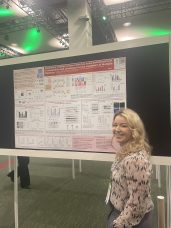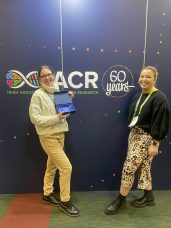Targeting the anti-apoptotic BCL-2 dependence in Multiple Myeloma
 Dr Tríona Ní Chonghaile and Lyndsey Flanagan
Dr Tríona Ní Chonghaile and Lyndsey Flanagan
Lyndsey Flanagan has been awarded the Breakthrough Cancer Research Scholarship 2020. Lyndsey will work with Dr Tríona Ní Chonghaile and Dr Siobhan Glavey at the Royal College of Surgeons in Ireland.
Within your body, there’s a group of cells called plasma cells whose job is to fight off infections to keep you healthy. However, sometimes these plasma cells go rogue and become cancerous, leading to a disease called Multiple Myeloma (MM). In MM, these unruly cancer cells multiply uncontrollably in the bone marrow, causing problems like tiredness, bone pain and increased susceptibility to infections. Sadly, in Ireland alone, around 300 people face this diagnosis each year, and less than 50% of patients survive five years after the diagnosis. Especially concerning is the struggle faced by older patients, who often can’t handle the harsh treatments available.
BCL-2 is an anti-death protein, which acts like a shield, preventing these cancer cells from dying. One way that MM cells become resistant to treatment is through increasing the amount of this anti-death protein. A drug called venetoclax was developed; it targets BCL-2 and only causes death in cells that are reliant on BCL-2 for survival. Unfortunately, venetoclax only works in a small subpopulation for MM patients, who have high levels of BCL-2. Therefore, this research project aimed to find a drug that would make venetoclax work better in MM, broadening the patient population that will respond to treatment and make more survivors.
To identify those who would benefit the most from venetoclax treatment, we used a technology called BH3 profiling. Through a clinical collaboration with consultant haematologist, Professor Siobhan Glavey at Beaumont Hospital, we found a patient with very aggressive MM. This patient had high levels of BCL-2, making them a perfect candidate for venetoclax treatment. The result? An incredible 10-month remission!
We then went on to explore ways to make MM cells more vulnerable to venetoclax treatment, thereby broadening the MM patient population that could benefit from treatment. To identify a partner drug, that would make venetoclax work better in MM, we tested a panel of epigenetic drugs (drugs that can switch genes on and off again). We tested various drugs and found a promising one called 5-azacytidine. When paired with venetoclax, it worked like a dynamic duo, killing MM cells effectively while sparing the good immune cells. This combination wasn’t just a laboratory success; through our clinical collaboration, we were able to test it on 11 bone marrow samples from MM patients at different stages of the disease, including those who had undergone previous treatments. The results were exciting – it was effective across the board, showing promise for a wider range of patients, including older individuals who might not handle aggressive treatments well.
Simply put, by finding a sidekick drug for venetoclax, the hope is that this treatment will be more effective and more patients with MM can benefit from this treatment. This could mean better survival rates and improved quality of life for those battling this challenging condition. As we move forward, our goal is to turn this promising discovery into a practical treatment option. The road ahead involves further testing, refining the drug combination, and ensuring its safety and effectiveness in larger groups of patients.
Research Findings
Publications
Lyndsey Flanagan, Siobhan Glavey, Triona Ní Chonghaile. Functional Precision Profiling: The Way Forward for Personalized Medicine. Commentary – Journal of Clinical Haematology (2021) Volume 2, Issue 3 http://s8)X&R3e4qv
Siobhan V. Glavey, Lyndsey Flanagan, Rachel Bleach, Claire Kelly, John Quinn, Trıona Nı Chonghaile, Philip Murphy,†Secondary plasma cell leukaemia treated with single-agent venetoclax. British Journal of Haematology, 2020, 190, e233–e264 Br J Haematol – 2020 – Glavey – Secondary plasma cell leukaemia treated with single agent ven[2305843009338243857].pdf
Sullivan GP, Flanagan L, Rodrigues DA, Ní Chonghaile T. The path to venetoclax resistance is paved with mutations, metabolism, and more. Sci Transl Med. 2022 Dec 7;14(674):eabo6891. doi: 10.1126/scitranslmed.abo6891. Epub 2022 Dec 7. PMID: 36475901. The path to venetoclax resistance is paved with mutations, metabolism, and more | Science Translational Medicine
Poster Presentations
- Lyndsey Flanagan presented a poster at the EACR-AACR Basic & Translation Research Conference 2024 titled, “Epigenetic modifier screen identifies the novel combination of 5-azacytidine and venetoclax for the treatment of Multiple Myeloma”, and was awarded a merit poster.


Back









 Contact
Contact